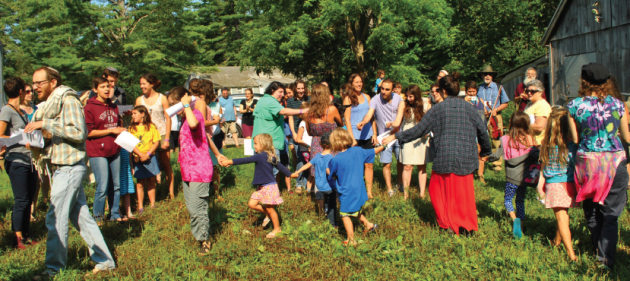Tag : accessibility
April 20, 2020 by admin
Let My People Sing

photo: ©let my people sing!, www.letmypeoplesing.org.
There’s a Hasidic story about a man who lived in Poland, renowned across the country for the fervor of his prayers. After the Baal Shem Tov made a long journey to see him, he found a shepherd boy standing on a hilltop, calling out letters one by one. “Bet! Reish! Vav!” he cried out, on and on, and then, “Master of the Universe, this is all I can do. Please, arrange the letters in the proper way.” When I first heard this story, I recognized in it those of us filled with a hunger to express ourselves, to cry out in prayer, and to contribute, but who didn’t start out knowing how to piece the letters together—metaphorically or literally. I’ve devoted my rabbinate to creating spaces where people like me, like this fabled shepherd boy, can access Jewish tradition and thrive. As it turns out, one key to finding that space is through music. Five years ago, five friends—Margot Seigle, Batya Levine, Ilana Lerman, Noam Lerman, and myself—came together to run a weekend-long retreat dedicated to sharing and singing Jewish music, called Let My People Sing! (LMPS). The project began as an experiment. We imagined that 50 people might join us. Instead, 150 people signed up that first summer, and gathered in the woods of Connecticut to sing. We sang in Hebrew, Ladino, Yiddish, Arabic, Aramaic, English, Spanish—wherever Jews have dwelled in diaspora, we sang, and shared all that we knew from these lineages. These days, I’m no longer surprised that interest has bloomed beyond what we had imagined. Music is medicine. Music has the ability to free and heal the soul. Of course, this belief is in no way unique to LMPS, and is in fact our shared cultural inheritance. But because so many of us have lost access to our traditions, we created LMPS as a place where people could reclaim them. At LMPS, everyone can be a leader and a learner of song. We start from the assumption that building community should be an intergenerational and radically inclusive project, one that thrives through our differences, including religious and political. We aim to foster a culture of love, so that participants feel safe and encouraged to take risks, develop new skills, and try out new forms of leadership. On Shabbat afternoon during the retreat, one can wander around and hear the floating music of many song circles at once: Baghdadi-Indian Melodies of Shabbat; Songs for All Sorts of Survivors; Yiddish Songs About Moshiach; Syrian Piyyutim; How to Engage Children in Song— just to sample a handful. Many of us long to restore broken lineages of cultural transmission, hungering to sing the music of our ancestors lost to us through centuries of migration, persecution, and assimilation. We also sing original songs created by Jewish artists and cultural activists today. MÓNICA GOMERY, ““How Singing (Yes, Singing!) Can Create Radical Jewish Accessibility” The Lilith Blog.
- No Comments
July 9, 2019 by admin
“Can I Borrow Your Wheelchair?”
“A culminating moment for me was when one of the resident advisors in my dorm—an able-bodied woman—asked if she could borrow my wheelchair for a simulation during Disability Awareness Week. Of course, I said no. I was so frustrated that the university saw disability as a problem to be fixed. I was also the first student who used a wheelchair to be enrolled in the Honors College. The building had a ramp, but not automatic doors, and there was no easy way for me to get to the lounge or computer areas. Some of the professors held events in their homes and I was never able to go. I felt as though I was always throwing a wrench into their erudite plans. I was not mistreated, but they were unprepared for a physically disabled student. It was a complete lack of recognition that dealing with disabilities involves complex and nuanced solutions.”
Disability rights activist Emily Ladau on “How to Make Feminism Include Everyone,” an interview with ELEANOR J. BADER, The Lilith Blog, March 2019.
- No Comments
 Please wait...
Please wait...